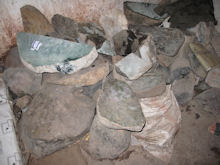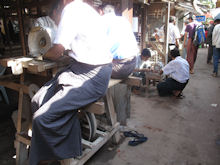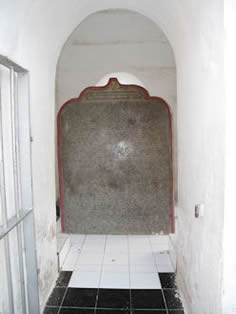

Myanmar pg 4
5. In Mandalay – 13th Jan 2011
5.1 General
Mandalay is Myanmar’s second largest city, located about 700km north of Yangon. It is relatively new, built in 1857-59 to replace Amarapura as the capital. It is known as the “Gem City” with a population of 1.2 million. It is an important Buddhist religious centre and is also upper Myanmar’s main commercial, educational and health center.
It was the last capital of the Myanmar kingdom. It fell to Britain in 1885 and was nearly destroyed during the Japanese occupation in World War II. It is the place where the famous Mahamuni Pagoda and over 700 others that house marble tablets inscribed with Buddhist scriptures are located.
In Mandalay, we visited the following places: 1. U Bein Bridge, 2. Mahamuni Buddha, 3. Gold leave making factory, 4. Kuthedaw, the world largest book and 5. Mandalay Hill.
|
|
5.2 U Bein Bridge
|
|
U Bein Bridge is reported to be the longest teak bridge in the world. It is 1.2km long. It was named after the mayor of Amarapura who built it in 1086 out of the remains of the dismantled Amarapara Palace. It has 482 spans and 1849 teak-wood posts some of which had been replaced by concrete posts.
The bridge links Amarapara with an island in the middle of Lake Taungthaman, which dries up during winter. During the raining season, the lake is filled with water and fishermen would cast their fishing nets. However, when it is completely dry in winter the fishermen would turn into farmers to tile the land.

Scenic part of Lake Taungthaman
5.3 Mandalay –A “Gem-making City”
|
|
|
Jade stones Making jade crystals Making gold leaves
Mandalay acquires all the gem stones from a town called Mogok, about 130 miles to the NE of the city. In Mogok, there are over 1,000 mines, with an area of about 4,800 sq. km and is the source of the world’s most fabulous rubies and sapphires.
Mogok is now the centre of the gem trade in Myanmar. The raw gem stones in Mandalay are obtained from Mogok. The raw materials are cut, polished and the finished gem stones are marketed in Mandalay.
5.4 Pagodas & Temples in Mandalay
- Mahamuni Pagoda.
|
|
Mahamuni Pagoda is the holiest pilgrimage site in Mandalay and the second holiest in Myanmar after the Golden Rock. It is located about 3km south of the city centre. It was built in 1784 by King Bodawpaya.
The main image within the pagoda is the Mahamuni Buddha. It is the most revered Buddha image in Mandalay. The image was cast during the life-span of Buddha. The image is 4m high and is cast in bronze. Its crown is decorated with diamonds, rubies and sapphires.
- Golden Palace Monaster
Golden Palace Monastery, also known as Shwenandaw Kyaung, is a historical monastery located near Mandalay Hill.
It was built by King Mindon in the 19th century. It is known for its teak carvings which adorn its walls and roofs. This monastery is the only remaining major structure of the original wooden Royal Palace today

Golden Palace Monastery
- Kuthodaw Pagoda
|
|
Kuthodaw Pagoda is a Buddhist stupa and lies at the foot of Mandalay Hill. It was built during the reign of King Mindon. The stupa, gilded above its terraces is 57m high and is modeled after Shwezigon Pagoda near Bagan. Surrounding the central golden Pagoda are 729 small cave-like structures, each containing a marble slab inscribed on both sides with a page of text from the Tipitaka. Kuthodaw is often named “the biggest book in the world’.
- Mandalay Hill
Mandalay Hill is 240m high and located to the NE of the centre of Mandalay city. It is well known for its abundance of pagodas and monasteries and is a major pilgrimage site for Buddhists in Myanmar for nearly two centuries.
At the top of the hill is the Sutaungpyei Pagoda. A panoramic view of Mandalay during sunset is most magnificent.


Back to Pg 3 / Pg 4 / Go to Pg 5










